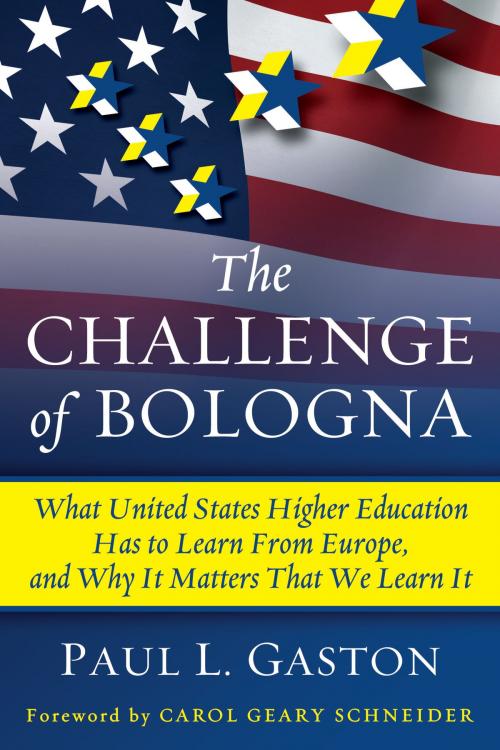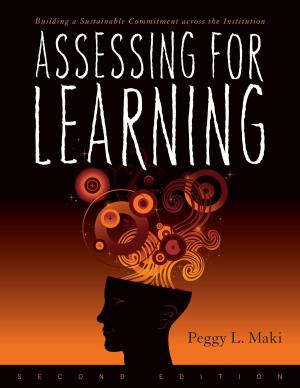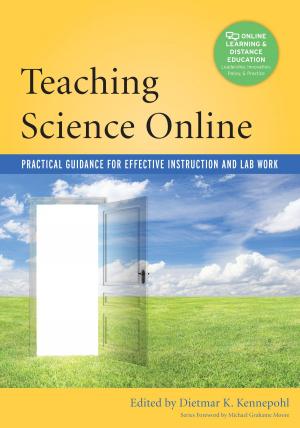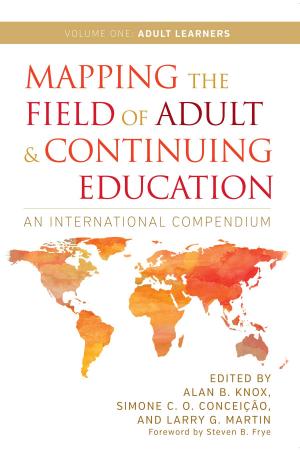The Challenge of Bologna
What United States Higher Education Has to Learn from Europe, and Why It Matters That We Learn It
Nonfiction, Reference & Language, Education & Teaching, Higher Education| Author: | Paul L. Gaston | ISBN: | 9781579225025 |
| Publisher: | Stylus Publishing | Publication: | March 12, 2012 |
| Imprint: | Stylus Publishing | Language: | English |
| Author: | Paul L. Gaston |
| ISBN: | 9781579225025 |
| Publisher: | Stylus Publishing |
| Publication: | March 12, 2012 |
| Imprint: | Stylus Publishing |
| Language: | English |
"Gaston brings order to a reform movement burdened by information overload. The Challenge of Bologna unfolds through descriptions of the reports from the reform process in Europe, analyses of its major aspirations and accomplishments, and consideration of their application to the U.S. The long subtitle of this book is key to Gaston's argument. Unlike other influential interpreters of European higher education reform, in particular Clifford Adelman, Gaston finds lessons for the U.S. in the process, not the specifics, of Bologna reforms. For anyone (including this reader) who has ventured into this labyrinth of documentation, Gaston's 'expeditious overview' provides a welcome FAQ-style introduction to the field."?Change
“Whatever their initial reaction to the Bologna developments, all U.S. educators will certainly need a fuller understanding of what is happening on other shores and of the motives that are propelling this high profile international effort. Paul Gaston’s fine study meets that need."?Carol Schneider, President, Association of American Colleges and Universities
This book is essential reading for anyone concerned about the ability of America’s higher education system to position the country for competitiveness in a global economy, about its failure to broaden access and participation, or to respond to calls for accountability, and specifically about whether it is ready to address the redoubtable challenge that Bologna Process represents on all these issues.
In this book Paul Gaston assesses the Process’ accomplishments, weighing its strengths and weaknesses, and evaluates which features pose a threat, which we can learn from, and which may be inappropriate for our system of higher education.
This book provides a realistic and balanced account of Bologna’s achievements, and suggesting how US higher education can constructively and effectively respond.
“Whatever their initial reaction to the Bologna developments, all U.S. educators will certainly need a fuller understanding of what is happening on other shores and of the motives that are propelling this high profile international effort. Paul Gaston’s fine study meets that need."?Carol Schneider, President, Association of American Colleges and Universities
This book is essential reading for anyone concerned about the ability of America’s higher education system to position the country for competitiveness in a global economy, about its failure to broaden access and participation, or to respond to calls for accountability, and specifically about whether it is ready to address the redoubtable challenge that Bologna Process represents on all these issues.
In this book Paul Gaston assesses the Process’ accomplishments, weighing its strengths and weaknesses, and evaluates which features pose a threat, which we can learn from, and which may be inappropriate for our system of higher education.
This book provides a realistic and balanced account of Bologna’s achievements, and suggesting how US higher education can constructively and effectively respond.
"Gaston brings order to a reform movement burdened by information overload. The Challenge of Bologna unfolds through descriptions of the reports from the reform process in Europe, analyses of its major aspirations and accomplishments, and consideration of their application to the U.S. The long subtitle of this book is key to Gaston's argument. Unlike other influential interpreters of European higher education reform, in particular Clifford Adelman, Gaston finds lessons for the U.S. in the process, not the specifics, of Bologna reforms. For anyone (including this reader) who has ventured into this labyrinth of documentation, Gaston's 'expeditious overview' provides a welcome FAQ-style introduction to the field."?Change
“Whatever their initial reaction to the Bologna developments, all U.S. educators will certainly need a fuller understanding of what is happening on other shores and of the motives that are propelling this high profile international effort. Paul Gaston’s fine study meets that need."?Carol Schneider, President, Association of American Colleges and Universities
This book is essential reading for anyone concerned about the ability of America’s higher education system to position the country for competitiveness in a global economy, about its failure to broaden access and participation, or to respond to calls for accountability, and specifically about whether it is ready to address the redoubtable challenge that Bologna Process represents on all these issues.
In this book Paul Gaston assesses the Process’ accomplishments, weighing its strengths and weaknesses, and evaluates which features pose a threat, which we can learn from, and which may be inappropriate for our system of higher education.
This book provides a realistic and balanced account of Bologna’s achievements, and suggesting how US higher education can constructively and effectively respond.
“Whatever their initial reaction to the Bologna developments, all U.S. educators will certainly need a fuller understanding of what is happening on other shores and of the motives that are propelling this high profile international effort. Paul Gaston’s fine study meets that need."?Carol Schneider, President, Association of American Colleges and Universities
This book is essential reading for anyone concerned about the ability of America’s higher education system to position the country for competitiveness in a global economy, about its failure to broaden access and participation, or to respond to calls for accountability, and specifically about whether it is ready to address the redoubtable challenge that Bologna Process represents on all these issues.
In this book Paul Gaston assesses the Process’ accomplishments, weighing its strengths and weaknesses, and evaluates which features pose a threat, which we can learn from, and which may be inappropriate for our system of higher education.
This book provides a realistic and balanced account of Bologna’s achievements, and suggesting how US higher education can constructively and effectively respond.















